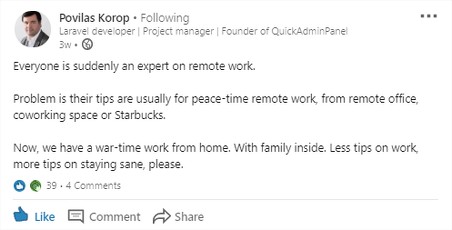Should we continue working remotely after the pandemic ends? It is a question many companies and leaders are going to face soon.
In this post, I want to warn you: many won’t be as productive working remotely after the pandemic as they were during it. However, the below might not apply to teams who worked remotely long before the COVID-19.
Memes are flying all over the internet on how COVID-19 led the digital transformation of many companies. Even the most conservative enterprises, where it seemed to be impossible to work from home, managed to allow work from home set up within a week or two. Work inboxes were flooded with tips and tricks on how to be productive at home. Povilas Korop beautifully summarized:

Over the past years, I’ve been working with remote teams spread over the Nordics. Collaboration with distributed stakeholders requires way more effort, no doubt about that. But even if you master remote work tools to perfection, there is no technology to replace face to face discussion. For that reason, I traveled often to meet the teams, discuss problems and whiteboard solutions.
Now, I can’t travel and we are still quite productive. Does it mean I won’t need to meet my teams face to face ever again? Can I work out of my home forever now? NO!
First of all, some kind of work is more suitable for remote than others. Technically speaking, Software Developers can work almost from any place in the world. But there are aspects related to security, client agreements, data location, legal stuff. Working from home increases risks related to
Even if you got approvals to work from home during the pandemic, it doesn’t mean these privileges will last after COVID-19 ends
Secondly, I’ve heard one argument: “Now everyone works well because they have to stay at home. Wait till people can go outside and you won’t see them. Forget about producing deliverables and achieving project objectives on time”. If you are dealing with such a professional attitude, that probably means saying goodbye rather quickly to such individuals.
It brings me to the third point, beautifully summarized by Randy Shoup in one of his talks - “High Performance Remote and Distributed Teams”.
“A strong recommendation that I have reinforced over and over again in my experience is a team should be collocated in a physical space to take advantage of that, or everybody on the team behaves as if they’re remote, even if they happen to be in the same place. The anti-pattern or the ones that don’t match this are mostly people are in the same site, except for Randy who’s remote. That never works. It works for a little while if you already know you could trust Randy, but over time, the isolation and the separation is very difficult.” - Randy Shoup
In other words, to be efficient, a team has to be fully onsite at the office or all members connect remotely
When you have humans all together, we are social animals, and so it’s going to be very difficult to avoid having the local quick architecture conversation and design conversation, and then informing Randy later, or maybe even forgetting to inform Randy later. We’ve all had that experience, that doesn’t work. That’s why I strongly say that at the team granularity, squad, whatever you want to say, it should be all in single site or remote-first.
It’s so easy to make decisions over a cup of coffee. It’s even easier to forget to inform a remotely working colleague about it.
Last but not least, you consider yourself an introvert and you enjoy working from home? You do hope it will last forever? You might be interested in psychological studies on mistakenly seeking solitude. Dr Laurie Santos in her podcast The Happiness Lab Episode 4 explores ways in which talking to people can bring us all genuine joy.
Even the hardest introverts will benefit from some interactions.
To summarize, remote work requires extra effort to be trully productive remotely. Some can’t wait to go back to the office, chat with others over a cup of coffee, do work, enjoy workplace without kids running around. Others got used to remote and confirmed themselves they can deliver out of homes. Some work harder, not being able to distinguish between private and work time. Some find extra time and they don’t need to sit at the office once they finish the work.
Two tips I suggest going forward:
- If possible, avoid situations of having individuals working remotely and the rest of the team in the office. Rather choose days when everyone works remotely.
- Stop making important decisions over a cup of coffee. Every work-related meeting should be via Teams/Slack and document your agreements. For example, use Architecture Decision Records to track system changes.
One of the best resources on remote work I’ve found so far, has been created by the Toptal team The Suddenly Remote Playbook.
